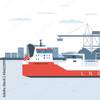Hamburg Leads Foreign Trade with India
A joint delegation consisting of representatives of Hamburg’s port-related industries and the marketing organization for Finland’s transport and logistics sector, Straight-way Finland, visited the Indian port city of Mumbai this week. At a workshop organized by Port of Hamburg Marketing (HHM) and the Indo-German Chamber of Commerce (AHK), Axel Mattern from HHM, Thomas Lütje and Bernt Wegener from HHLA Container Terminals GmbH, and Werner Schulze-Freyberg from Polzug Intermodal GmbH highlighted the strong trade relations between Hamburg and the Indian sub-continent in their presentations and then detailed the range of services available for the container-handling and intermodal transport segments. The participation of the Straightway Finland marketing organization in this workshop underscored Hamburg’s importance as a transit port for the Baltic Sea countries. Elina Multanen reported on the significant role played by Finland as a transit hub for the Russian market. More than 60 participants representing India’s seaport and transport industries also took the opportunity to find out more about current developments in the expansion of the infrastructure for Germany's biggest seaport. A day earlier, Germany's Consul General, Leopold-Theodor Heldman, and the Principal General Manager of the AHK, Bernhard Steinrücke, had already welcomed the combined German-Finnish delegation at a dinner for over 90 guests and had emphasized the good relationships between India and Germany at all levels. From January 2011, the Port of Hamburg will have its own representative office in India.
The Port of Hamburg is emerging as one of the winners from India’s rapid economic growth. The metropolis on the river Elbe is the most important container port in for-eign trade with India, ahead of all other major ports in Europe. This puts India in tenth place in the rankings of trading partners for the Port of Hamburg in sea-borne container traffic. Most notably the direct container traffic recorded an above-average improvement in the first half of 2010 with a result of about 87,000 TEU (20-foot stan-dard containers), up by 13.6 per cent year-on-year. India’s importance for Hamburg is even greater if Indian imports and exports routed as transit cargo via Sri Lanka or Arabian ports like Dubai are included, in addition to direct traffic with India. Some 75 per cent of the 3.5 million TEU handled in Colombo on Sri Lanka alone consist of container transhipments en route to or from India. In the first half of 2010, around 28,000 TEU were carried between Hamburg and Sri Lanka, and the bulk of this cargo originated in or was destined for India. One important reason for this high proportion of transhipments is the still limited capacity in Indian ports.
There is also a conventional scheduled liner service between Hamburg and India, operated as a joint service by SCI and the Hamburg-based Rickmers Line, calling at the ports of Mumbai, Chennai, Visakhapatnam and Haldia once or twice a month. Subject to demand, Indian ports can also be serviced by the conventional Europe-Asia-US Gulf-Europe Service operated by Chipolbrok. In addition to containers, con-ventional scheduled liner services carry mainly non-containerised general cargo, such as oversized and heavy machinery and plant components.
To benefit from the growth in this emerging economy, Hamburg’s transhipment companies are increasingly looking to the Indian subcontinent and are establishing part-nerships there in order to gear up for the future. The Free and Hanseatic City of Hamburg plays a major role in trade relations between Germany and India. A total of more than 500 Hamburg-based companies are involved in foreign trade with India, giving Hamburg an 11-per cent share in the volume of trade between Germany and India. Some 115 businesses based in Hamburg even have their own branches, production facilities or representative offices in India. The principal imports from India include clothing and textiles, chemical and pharmaceutical products, as well as nuts and dried fruit. Hamburg businesses mainly export aircraft, machinery, measurement and control technology, copper products, power generation equipment and chemical products. There is also increasing interest on the part of Indian companies in Hamburg as a business location: for example, the Indian company Mittal Steel, the world’s biggest steel group, acquired the steel maker Hamburger Stahlwerke, and the Hamburg-based wind power equipment manufacturer Repower was taken over by India’s Suzlon Energy Ltd.













